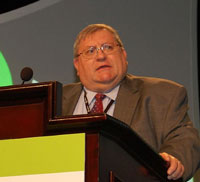One agricultural economist is disputing the findings of another when it comes to the impact on the domestic ethanol industry of removing the existing blenders tax credit and the associated tariff on imported ethanol.
 In dueling commentaries posted Tuesday on “The Hill’s Congress Blog,” Iowa State University’s Center for Agricultural and Rural Development (CARD) director and professor of economist Dr. Bruce Babcock, and ENTRIX technical director and agricultural economist John Urbanchuk share differing opinions about the impact of allowing allowing the current 45-cent-per-gallon ethanol blender’s tax credit (Volumetric Ethanol Excise Tax Credit, or VEETC) and 54-cent-per-gallon ethanol tariff to expire at the end of this year.
In dueling commentaries posted Tuesday on “The Hill’s Congress Blog,” Iowa State University’s Center for Agricultural and Rural Development (CARD) director and professor of economist Dr. Bruce Babcock, and ENTRIX technical director and agricultural economist John Urbanchuk share differing opinions about the impact of allowing allowing the current 45-cent-per-gallon ethanol blender’s tax credit (Volumetric Ethanol Excise Tax Credit, or VEETC) and 54-cent-per-gallon ethanol tariff to expire at the end of this year.
 Babcock did a study, funded by the Brazilian sugarcane industry, that found there would be only a “modest” impact on the industry if the VEETC and tariff went away. Urbanchuk, who has done numerous economic studies for the U.S. ethanol industry, disagrees. “That’s true only if you take a “Field of Dreams” view of the ethanol industry: If we mandate that Americans use more ethanol, then someone, somewhere will produce that ethanol,” Urbanchuk writes. He says that “removing the tax credit would encourage the export of another U.S. industry.”
Babcock did a study, funded by the Brazilian sugarcane industry, that found there would be only a “modest” impact on the industry if the VEETC and tariff went away. Urbanchuk, who has done numerous economic studies for the U.S. ethanol industry, disagrees. “That’s true only if you take a “Field of Dreams” view of the ethanol industry: If we mandate that Americans use more ethanol, then someone, somewhere will produce that ethanol,” Urbanchuk writes. He says that “removing the tax credit would encourage the export of another U.S. industry.”
Meanwhile, Growth Energy notes in a blog post that the Babcock study assumes that the U.S. market will be able to utilize intermediate ethanol blends, such as E15, that will increase demand. According to the Babcock paper (top pg 12), “The key assumption here is not EPA approval, but rather, that EPA approves implementation of intermediate blends in a manner that increases the market demand for ethanol enough to sell 15 (billion gallons) at 75% of the price of gasoline.” Growth Energy says, “That is the essential contribution of the paper: if the ethanol industry gets access to a bigger share of the market, the government supports aren’t as important.” So, in other words, both views could be right, depending on whether or not the market is increased to 15 percent.

